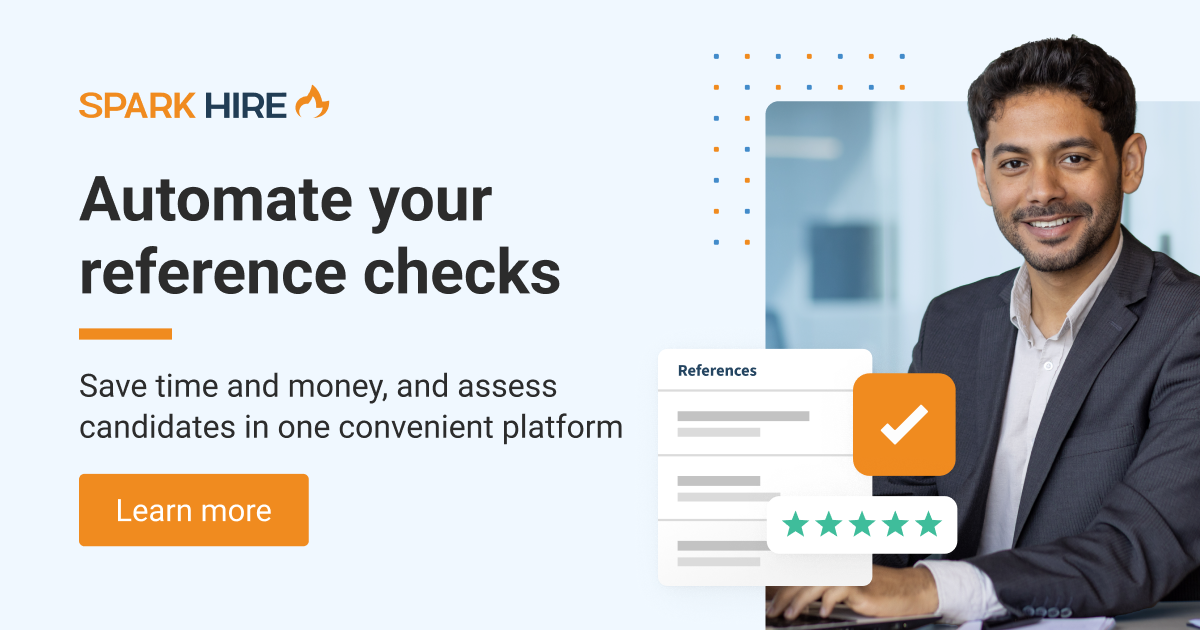As hiring managers and HR professionals navigate the evolving recruitment landscape, digital reference checks have become essential for gaining deeper insights into potential candidates.
While the traditional reference check involves tedious, manual phone calls and emails, the digital era has ushered in a more efficient and streamlined hiring process. This includes the implementation of reference check software.
Keep reading to learn more or jump straight to our list of key strategic questions you should include in your digital reference checks to extract the most valuable candidate information.
Table of contents
Reference Check Software and Questions
Key Takeaways
- Enhance Hiring Efficiency: Digital reference check software streamlines a traditionally manual and time-consuming process, making it faster and more efficient while still providing valuable insights into candidates.
- Key Questions to Ask: It’s not enough to ask just any job reference questions. Asking strategic questions, such as those about job performance, challenges faced, and interpersonal skills, can help hiring managers gather invaluable insights about a candidate’s qualifications and cultural fit.
- Informed Decision-Making: Reference check software empowers HR teams to make more informed hiring decisions, allowing for a more accurate and honest assessment of a candidate’s potential.
Candidate documents such as a completed job application, resume, cover letter, portfolio, or personal website offer valuable insights into a job applicant’s background and qualifications. However, reference checks are another critical portion of the candidate screening process that can’t be overlooked.
Top 10 Questions to Ask During Reference Checks
Below are 10 key questions to ask during reference checks to ensure you can make the most informed decisions about your potential candidates.
1. Can you verify the candidate’s job title, responsibilities, and dates of employment?
This fundamental question establishes a baseline, allowing you to confirm the accuracy of the candidate’s work history and experience level as presented in their resume.
2. How would you describe the candidate’s overall performance in their role?
Invite the reference to provide an overview of the candidate’s performance, highlighting strengths, weaknesses, and any notable achievements. This question gives you a holistic view beyond the specifics of the job description.
3. Can you share examples of the candidate’s key accomplishments or projects during their time with your organization?
Understanding a candidate’s impact on previous projects or achievements provides insights into their skills, work ethic, and ability to contribute positively to your team.
4. How did the candidate handle challenges or difficult situations?
Assessing a candidate’s problem-solving skills and ability to navigate challenges is crucial. This question provides a glimpse into their resilience and adaptability.
5. Can you comment on the candidate’s interpersonal and communication skills?
Effective communication is vital in any workplace. By delving into the candidate’s interpersonal skills, you can gauge their ability to collaborate and communicate with team members, clients, and superiors.
6. Did the candidate exhibit strong leadership qualities or the ability to work well in a team?
Tailor this question based on the specific requirements of the role. Understanding how the candidate operates within a team or takes on leadership responsibilities is key to predicting their future performance.
7. How would you describe the candidate’s time management and organizational skills?
Time management is a critical competency for success in most roles. Use this question to explore the candidate’s ability to prioritize tasks, meet deadlines, and handle a demanding workload.
8. In what areas do you believe the candidate could benefit from additional development or training?
No candidate is perfect, and understanding their areas for improvement is crucial for providing targeted support once they join your team.
9. Would you rehire this candidate if the opportunity arose? Why or why not?
The ultimate litmus test: if given the chance, would the reference hire the candidate again? This question can reveal overarching sentiments about the candidate’s overall fit and impact.
10. Is there anything else our organization should know about the candidate that hasn’t been covered?
Conclude the reference check by allowing the reference to share any additional insights. An open-ended question such as this can reveal further candidate insights that previous inquiries may have missed.
Make the Most Informed Hiring Decisions, Driven by Job References
Digital reference checks are a powerful HR tool for hiring managers and HR teams to gather comprehensive insights into a candidate’s professional history and potential fit within the organization. By posing job-specific strategic questions, you can navigate the digital reference check process with precision and ease, ensuring you have all the information needed to make informed and confident hiring decisions.
Ready to elevate your decision-making and streamline your hiring process? Contact the HR experts at Spark Hire to get started.




